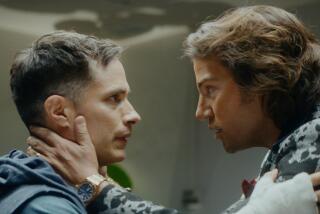Tough guys on wheels
- Share via
No handshake, no hello. Just heads buried in menus and hands reaching for the hummus. A tape recorder gathers silence; I scribble the word “awkward” onto a pad.
Mark Zupan, Joe Soares and his son sit at a table for four -- with only two chairs -- Zupan and Soares having arrived by wheelchair, a pair of quadriplegics on opposite sides of the table, on opposite sides of seemingly everything. They’ve come to discuss “Murderball,” a documentary, opening Friday, in which they both star. But it is clear there will be no idle chit-chat.
“If Joe were on the side of the road on fire,” Zupan says about 10 minutes into the film, “I wouldn’t piss on him to put it out.” On hearing it again, Zupan smiles and turns his eyes to a window. “That’s pretty much how it’s always been,” he says. “We coexist when we need to coexist, and then when it’s our time ... “ “ ... we go our separate ways,” Soares chimes in, finishing the thought. “Let’s put it this way -- neither one of us is going to the other’s house for Thanksgiving.” Sworn adversaries, both on screen and off.
Originally brought together by an eye-opening sport called quad rugby -- once called murderball -- Zupan and Soares met in 1996, fittingly as members of opposing teams. Zupan was then 21 and still relatively new to the game; Soares was 36 and had long been regarded as the superstar. Each thought of the other as being too cocky for his own good, and, well, not much has changed.
But “Murderball,” shot for 2 1/2 years beginning in 2002, catches these rivals at very different points of their respective careers: Zupan is now the tough-talking Texan and star of Team USA quad rugby; Soares is the former Team USA star who’s now coaching Team Canada and practically drooling at the thought of beating his former countrymen.
The film spans from the 2002 Quad Rugby World Championships in Sweden through the 2004 Paralympics in Athens. And from about 200 hours of stock footage, an 86-minute documentary was born -- one with a seemingly clear agenda: educate first, entertain second.
“They came in saying, ‘We don’t want to make this a gimp movie,’ ” Zupan said of directors Dana Adam Shapiro and Henry Alex Rubin. “It wasn’t going to be ‘Here’s me, the poor old cripple.’ The cool thing about the film is that it answers questions people don’t want to ask, and it knocks every misconception that you ever had about somebody in a wheelchair.”
The sheer and sometimes surreal brutality of quad rugby, which is played on a basketball court, answers the fundamental question of mobility, these chair-bound athletes constantly barreling into each other and then spilling over onto the ground. “We’re not all like Christopher Reeve,” Soares says of quadriplegics, who by definition are those who have some impairment in all four limbs.
And then there’s the multitude of questions answered away from the court.
Sex? “That still works,” Zupan explains to the camera.
Self-dependence? “I’ll be at the grocery store and somebody’ll ask me if I need help getting back into my car,” Zupan’s teammate, Andy Cohn, says during an introductory sequence. “It’s like I wouldn’t have come to the grocery store if I couldn’t get back into my car.” There is boozing, trash-talking and rock ‘n’ roll, and practical jokes intertwined with private moments of despair.
And then there are Zupan and Soares, at first resembling the hero and the villain, respectively, though that line begins to blur when the sport-crazy Soares suffers a nonfatal heart attack before our eyes and then noticeably softens his demeanor during his recovery.
The finished product has thus far played to widespread critical acclaim; “Murderball” won the Audience Award at the Sundance Film Festival in January.
“Some people can’t look past the chair, they really can’t,” Soares says. “The movie will help break that.”
“About 10 minutes in, you forget the people are even in chairs,” Zupan adds. “Once the exposure gets out there, it is going to change perceptions.” It is a lonely agreement during a meal rife with discord. Moments later, there comes yet one more.
“I would not change anything,” Soares says of his disability, caused by a bout of polio when he was 17 months old. “If I hadn’t gotten sick, I might not have the type of life I have now. I have two great kids, I’ve got a great wife, I’ve got a good life.”
“There are some things I miss,” Zupan then admits, the goateed and tattooed muscleman now unable to walk because of a car accident when he was 18. He was flung from the bed of a pickup and into the cold waters of a canal. He clung to a branch for nearly 14 hours before being discovered.
“I miss throwing on a pair of shoes and just going out for a jog,” he says, “but would I change that and give up what I’ve come to have now? There’s no way. I’ve done more in a chair than I’ve done out.”
The meal over, Soares rolls past Zupan with his son by his side. No handshake, no goodbye, these men finally parting ways but now forever linked by this story of getting hit -- and then hitting back.
More to Read
Only good movies
Get the Indie Focus newsletter, Mark Olsen's weekly guide to the world of cinema.
You may occasionally receive promotional content from the Los Angeles Times.










